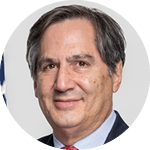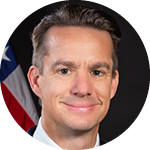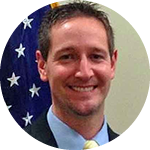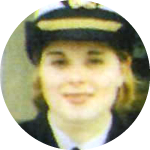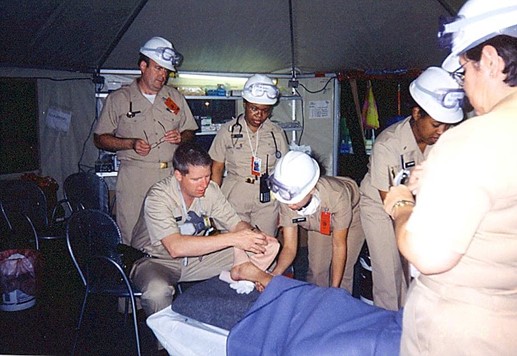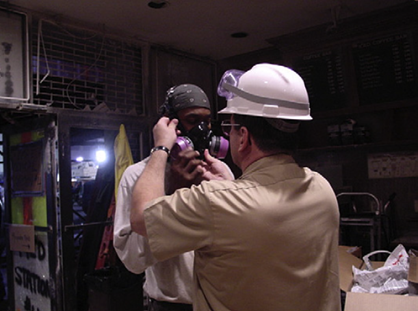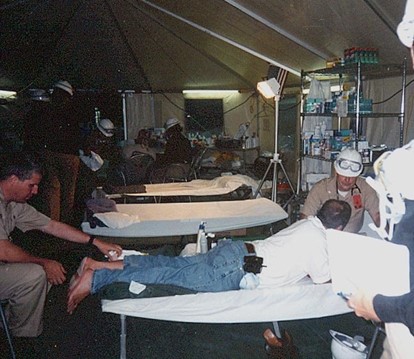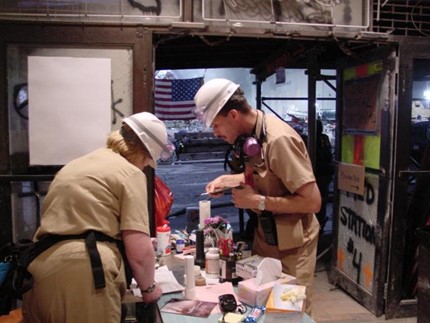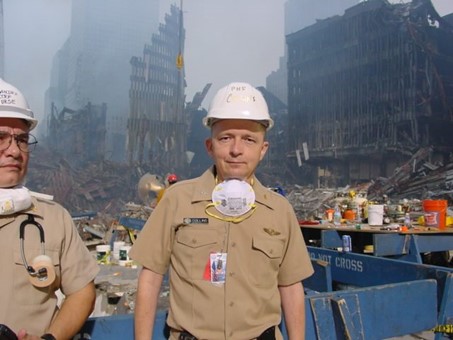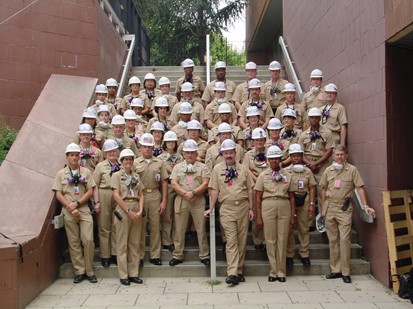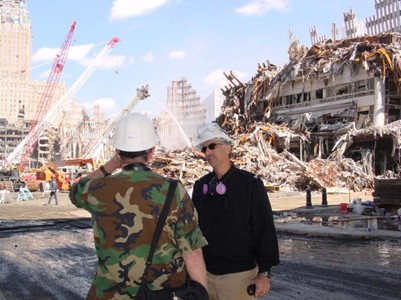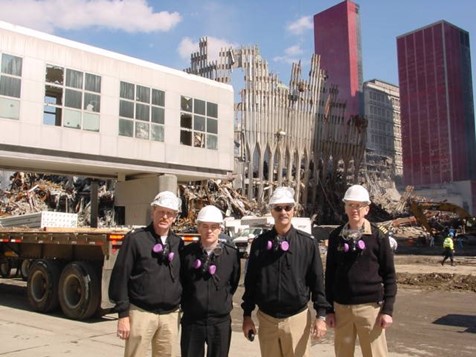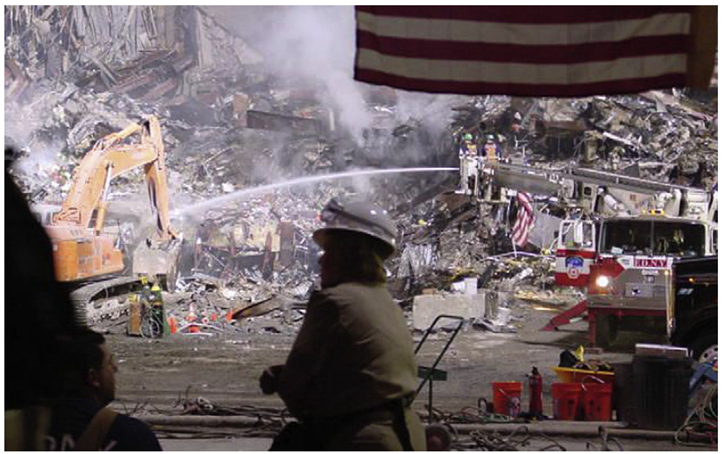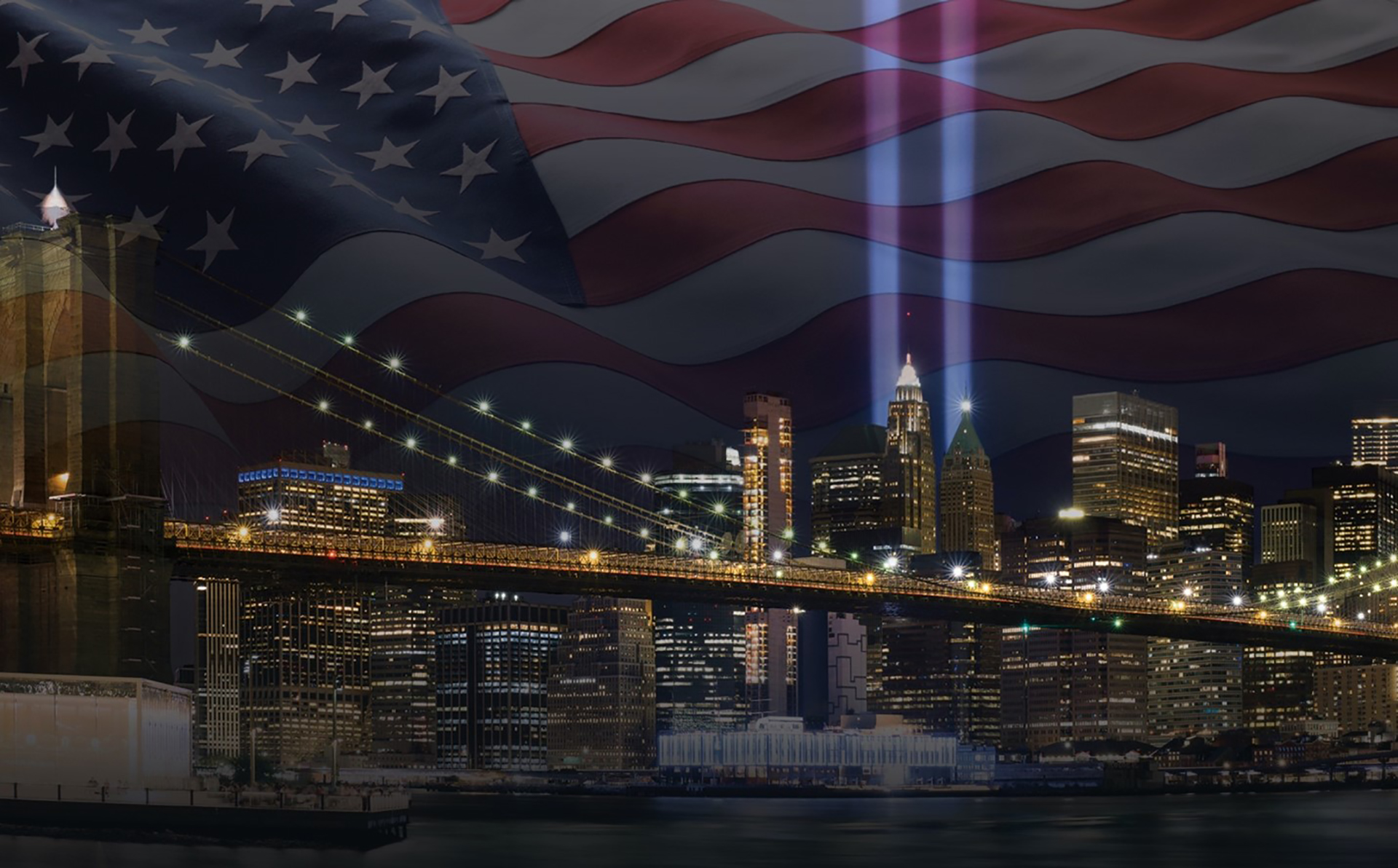
This year we will mark the 20th anniversary of the 9/11 terrorist attacks. It was a day that changed our country and our way of life forever. It became the type of “where-were-you-when?” moment for a new generation. It was also an event that inspired millions of people to step up and serve this country; to turn tragedy into meaning.
As the legacy of 9/11 transitions from living memory into U.S. history, the stories of those who were inspired to serve, or to continue serving, in the wake of 9/11 must be told. ICE recalls some of the stories of those who were serving, who were inspired to serve and those who continue to be inspired by great acts of service in the 20 years following that fateful day September 11, 2001.
Video: Becky Brown
Video: William Stoppel
Video: Aaron Andrews
Learn the personal stories of how 9/11 impacted the lives of ICE employees
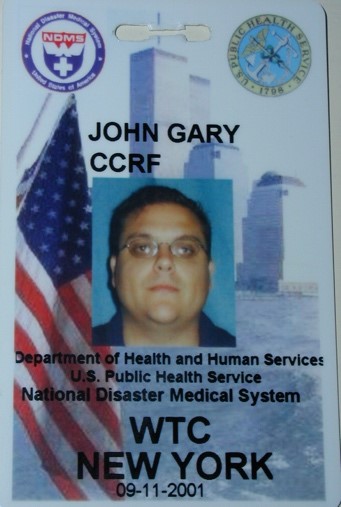
CDR John Gary
Medical Asset Support Team Nurse
New York City Field Office
Sept. 11th started as a normal workday as a staff nurse at Division of Immigration Health Services in Queens, New York, located in a small 200 bed converted warehouse next to John F. Kennedy International Airport. I had just returned from a medical escort mission to Belgrade, Yugoslavia, and was preparing to attend the Certification of Emergency Nursing conference in Florida. We began to hear about something happening so we turned on a television in the back of the clinic and watched the events unfold. The health services administrator, Captain James Imholte, and Clinical Director Dr. Neal Collins, directed us to go home to change into our battle dress uniforms and obtain supplies to prepare for an extended stay at the clinic, if needed. We watched and worked with our partners at the facility to prepare for the unknown future. We will always remember what it was like on that fateful day.
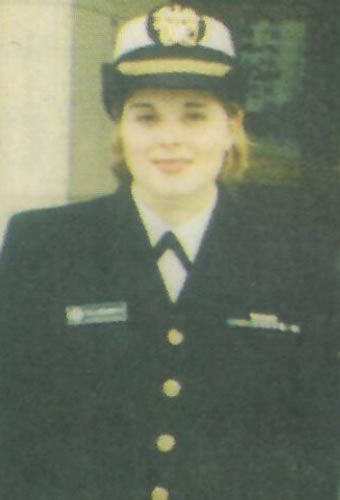
CAPT Shelly Glass
IHSC Western Regional Field Medical Coordinator
Laguna Niguel field office
My entire world changed on Sept. 11, 2001. While conducting sick calls in the clinic, the first plane hit the World Trade Center (WTC). We all knew our world would be different after news a second plane had hit the second tower. The former Immigration and Naturalization Service evacuated our entire detainee population after dinner that same day as the General Services Administration shut the building down. After administering the evening medication to the detainees, they were evacuated to other detention facilities in the area.
On the way home, when my subway came above ground in Brooklyn, I got my first live view of what was left of the WTC. Along with my fellow passengers, I went to the right side of the train car to see the bright lights set up so the rescue workers could continue to search. I could see the smoke and ash still in the air. What I could no longer see were those two towers standing so tall in the New York City skyline. The next day, we went into the office to complete the transfer summaries [abbreviated medical records to ensure continuity of medical care at receiving facilities] for the detainees evacuated the night before.
A few days later, our entire clinic staff deployed to the WTC to care for the rescue workers. It is not a time I talk about often. Honestly, I still have a hard time talking about it. However, it is a time of my life that I will never forget.
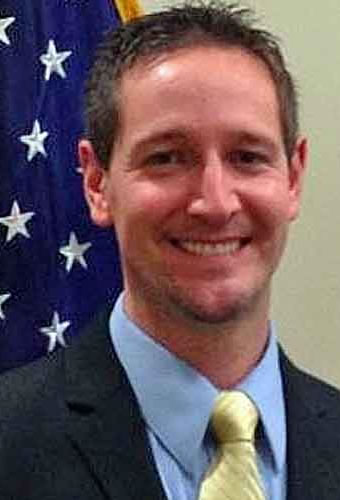
Russell Hott
When I was 16, I wanted to be a professor of philosophy and religion. I was fascinated by the way people saw the world and what motivated them. I wanted to wear old Levi’s with holes in the knees and a tweed sport coat with leather elbow patches and wax poetic about good vs. evil and Renė Descartes and Judaism and Alfred Wilhelm Nietzsche and Christianity and Islam.
When I was 18, I wanted to be a civil engineer. However, I was working as a produce manager at a grocery store on the weekends, working 40 to 50 hours in construction during the week, and going to school at nights. This ambition was taxing every fiber of my being, and I knew I needed to engineer a different trajectory for my life.
When I turned 19, my father shared a vacancy announcement with me for the Immigration and Naturalization Service (INS). I didn’t know much about the INS or its mission. In fact, I only vaguely recognized that it was a federal agency, was on the GS scale and its employee’s wore green uniforms patrolling the border. After kicking the tires, I thought I’d submit my paperwork and see where it went.
Shortly thereafter, I started working as a private investigator at a small firm, and I spent much of my time investigating insurance fraud and infidelity. Then I received a notice for an interview with the INS and subsequent medical testing and physical aptitude testing.
While waiting on the INS’ decision, I had to keep paying the bills, so in addition to the private investigator work, I also started selling new and used cars at a Ford, Lincoln, Mercury dealer. I went through a certified sales consultant training, and I spent long hours talking to people, getting to know them, and understanding their immediate needs.
Two years later, the INS called. I hesitated. At that time, the INS didn’t share the same public appeal as other federal law enforcement agencies. At the very least, I thought it could be a steppingstone to the U.S. Marshals Service or Alcohol, Tobacco, Firearms, and Explosives. That was my plan.
And then 9/11 happened.
That day, I watched with horror, like the rest of America, as the delicate fabric of our democracy was stripped away and burned. I watched our nation fall to its knees as nearly 3,000 innocent lives suffered horrible and tragic ends. I watched hearts break, buildings break, planes break. I watched as firemen, emergency medical technicians and police officers ran towards the danger while everyone ran from it. I watched neighbors, colleagues and loved ones cry out in agony. I watched as mothers, fathers, children anxiously awaited any sort of news of their loved ones.
That day will forever be part of who I am. I remember every smell, every emotion, every moment, every action in acute detail that day. I remember the deafening silence that followed in the skies immediately thereafter.
It was that moment that I found my compass in life. The INS, which had once seemed to be a passing ship in my life, now took on new meaning. I recognized the incredible importance that the INS played in national security and public safety. I witnessed the courage and dedication of the women and men who served on the front lines of the agency. I felt, in some way, that I would be part of something noble and honorable, something bigger than myself. I knew that I was forever changed and that the INS would be my home.
And now, as I look back on my career, I remember the Karen Oates, the Chief Rods, the Qs, the Jaimie Rods, the Sabbys, the 10-10 Tommys, the Rances, the Boyds, the D’Amatos, the Kidds, the Connollys, the Bowmans, and so many others who helped me to find my footing. I have had the personal privilege of bearing witness to the best of the agency (and the challenges). I watched the quiet professionalism, selfless dedication to duty and unrelenting commitment to the agency. I have been deeply and continually inspired by the women and men I’ve worked with, and I’m grateful to have found such strong allies in support of doing the right thing.
It’s so hard to believe that we are now remembering 20 years since that fateful day. That day made us stronger. It tested our resilience and our resolve. And, as I think about our role today, I know that no matter what comes next, we will persevere and build back better.
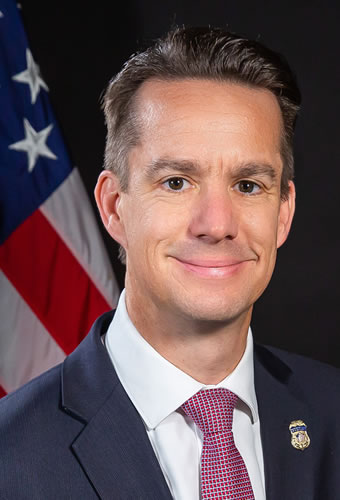
Rob Dunikoski
Deputy Chief Counsel
OPLA-Dallas
After 9/11, I wanted to do my part to help protect the country from the threat of terrorism. My wife and I had watched in horror as the towers fell. Our first child was due in a few days. I recall sitting on our porch wondering what kind of world the child would be born into…and then resolving to do my part to make the world safer.
I started law school the following year and secured a student internship with the newly formed U.S. Department of Homeland Security (DHS). As an intern, I worked on a national security matter that fueled my desire to be a part of federal law enforcement. But then life took me in a different direction.
Shortly after law school, I took a job with one of the largest law firms in the world handling commercial litigation. The position paid well and involved high quality and exciting work. But at the end of the day, the job did not fulfill me. In my heart, I knew that I wanted to do more with my career than just help resolve business disputes. And I also knew that I did not want to watch the war on terrorism from the sidelines, so I looked to join DHS.
In September 2007, I joined U.S. Immigration and Customs Enforcement (ICE) as an assistant chief counsel in the Dallas office. Since then, I have been privileged to be a part of numerous national security cases, including several involving the disruption of suspected terrorist activity. My time at ICE has given me a great appreciation for ICE’s important role in promoting national security. I am proud to be a part of ICE’s national security mission and grateful for the opportunity to do my part in working to help prevent another 9/11.
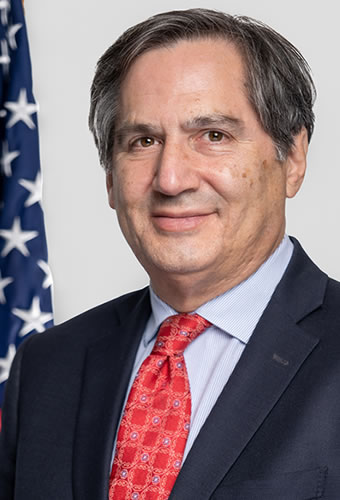
John Trasvina
Principal Legal Advisor
On the morning of September 11, 2001, I was Special Counsel for Immigration Related Unfair Employment Practices at DOJ and had an office on New York Avenue, a block from the White House complex. That Tuesday was a day none of us will ever forget – from our distraught receptionist who received a call that the Pentagon had been attacked to one of our legal advisors who heard that a plane was headed for the White House. I was planning on attending to my going-away lunch from DOJ, which was scheduled for noontime. Needless to say, the party did not happen and our lives were never the same.
I had planned to leave DC at the end of September after completing a four-year term as special counsel at DOJ and sixteen years in immigration-related posts in the Senate and DOJ. After the horror and the physical destruction caused by the nineteen 9/11 terrorists, we came together as a people and a nation. Beyond seeing spontaneous memorials and flowers throughout the DC area, the first public gathering I attended on Capitol Hill was to follow President Bush’s lead to warn against reprisals or attacks on individual members of the South Asian and Muslim American communities and share their fears. For those of us in the immigration field, national crises like this one call upon us to protect both our security and our liberty.
Departing Washington after that fateful day, I took a road trip to California because air traffic was suspended for a time. The drive allowed me to see the country and reflect upon my own public service and our shared values and future as a nation. No family and no community was untouched by the violence and tragedy of September 11. I witnessed evidence of America’s shared pain and responsibility in big cities and small towns across our country as I drove west. In the aftermath of 9/11, I became reacquainted with family and community and continued on my own immigration journey to teach Immigration & Refugee Policy at Stanford Law School and subsequently become an advocate and now, once again, a public servant at ICE.
September 11 is truly one of the handful of days of our lives that will forever be etched in our memories. For me, that includes the unity, resilience and international respect of the American people and our unique role here at DHS to maintain our stature as a beacon of freedom and, at OPLA, to respect and uphold the law.
Video: Bryan Landers
Video: Matthew Begay
Video: Joshua Otey
Video: Anthony Alvarez
Video: Victor Yee
